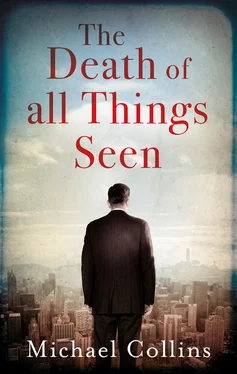What struck Norman was how the agent barely noticed him. The essential gaydar of how he had lived his old life was eclipsed in the presence of Joanne and Grace. He tried again to make eye contact with the assistant manager, the exchange not reciprocated.
On the fourth card, the assistant manager traitorously turned his back and made a phone call, so Norman understood it would have been more awkward explaining Grace’s presence in the company of Joanne than if he had been in the presence of Kenneth. He felt his virility, his sense of who and what he was, under threat. He felt a sudden seething reverse discrimination at this outright betrayal by one of his own kind.
Eventually, the manager, an African American woman of considerable bulk, came forward as Joanne began an unduly complicated story of how she had gone through an acrimonious break-up and had been cut off by a vindictive partner. It didn’t explain Norman or Grace, or how they figured.
The manager interrupted Joanne. All four declined cards were not in Joanne’s name. Furthermore, the authorized cardholder had canceled the cards. The cards were being held for security purposes. It was company policy. For a moment, it seemed the police were on their way.
Norman preemptively offered to pay with his card. He put on a voice of gay affectation again. He couldn’t help it. He made his appeal to the assistant manager, who disconcertingly looked to his manager, as if Norman was being confrontational and downright politically incorrect and homophobic. This was suddenly more than about a goddamn car rental. There was again the insurance issue, which couldn’t be covered by Norman’s card, since Norman wasn’t a licensed driver. It was company policy. It took a trip to an ATM to withdraw funds from Norman’s account, and then a trip to Joanne’s bank to pay down the sole card in her name before they could rent a car.
They went with Alamo Car Rental, a downmarket rental agency along the L track, where the wind swirled in the dark hulk of shadows. A train rumbled overhead on a steel spine of track throughout the transaction. All told, it cost him $2,645 to pay down Joanne’s card and secure the rental. They went with the full-sized at a teaser rate of $399 plus tax for the week. They then discovered Joanne couldn’t decline the supplemental coverage at $29.99 a day, since she had no car insurance.
There was no actual total cost, just a line item of costs and associated taxes, and they were coerced into purchasing the full tank option, so the car was to be handed back on empty or as close to empty as possible.
It was 1.15 p.m. before they were done and paid when the issue of where to eat reared. Grace was hungry, and she had to go as well.
They ate on Randolph Street, the street name bringing to mind the caged specter of Randolph, back in the apartment, suffering the interminable nature of their absence and the terrifying possibility they might never return, the Barbie long dead, and Randolph never understanding why they left in the first place.
In the clawing, protracted indecision, against the run of time, as Joanne purchased a Happy Meal, in the quiet salvage of something fast sinking, Norman reached for a napkin and wrote, ‘Why They Left and Where They Went — Theories of an Abandoned Dog’.
*
The day brightened into an incandescent blue sky. They left the funneling shadow of the downtown heading for the shimmer of Lake Michigan and the northern suburbs. The air had a sudden windblown crispness. This was a Wednesday in deep winter, the cold freeze of an Arctic high-pressure system that dipped into the south. It was good to be out among the living. Norman felt it suddenly, after the anxiety passed and they were on the road.
Joanne hadn’t driven in a long time. In fact she hadn’t since her days driving her infamous Pontiac Sunbird that her father had cobbled together for her drives to and from Chicago during college. She talked with an overriding sense of brimming enthusiasm. She was recovered from the debacle at Hertz. It was good to be behind the wheel of a car. She liked movement and the feel of the open road and held the decided understanding that money, despite what people said, could and did buy happiness. She said something to that effect on the run up along Lake Shore Drive, passing the intersection where Helen Price had driven into the lake.
Norman let the coincidence pass without comment. A bleak awareness registered, but only for a moment. It passed just as quickly. This was the discharge of a life. He had moved on, or felt he had. He was, at least, trying.
He looked up and had to catch his breath. In truth, it was difficult deciding what he thought about the house really. It was one of those post-war ranches tacitly conceived for all eventualities, not least of all for returning amputee war heroes looking for the unencumbered run of a wheelchair through a house with long hallways and well-lit rooms, a GI, still young and finding a wife in the flush of youth willing to accommodate stumps, so a great intimacy might be shared, so there would be children eventually, and the children of children yet, and they would see it as a couple, in this house, before their lives were over.
These homes, they were mausoleums really, passed from one anonymous family to another. He felt the act of home buying should have come with an exorcism, or perhaps something less mordant, a prayer for continued journey, a reading forth of names, if simply to acknowledge and appease the dead.
Norman looked away from the lake. He was trying so very hard to contain a feeling, to move toward a point of normalization, when beyond the cutting cynicism lay a deeper reality of why, if he’d had his way, he would not have gone out to the house. What he remembered of the house, what he thought about it, was something else entirely.
He had captured it in one of his early shows, a converging homosexual awakening that had coincided with the unfolding bogeyman drama of John Wayne Gacy.
What had frightened him at the time was the contained life a person could live, how Gacy had lived and murdered in the precincts of his own home. It taught Norman how life could be concealed, compartmentalized, how a perverted sense of one’s desires — or, equally, one’s ambitions — could be serviced amidst the lives of others.
In the associated coming of age of his own homosexuality, in stashing his magazines in, of all places, the crawlspace in his home, he had come to align himself with Gacy — sexual release associated with the smell of crawlspaces, mildew and fetid darkness; sex connected with the rasping scrape of a shovel; sin spaded in mounding dirt; the grey slur of concrete poured in the finality of a conquest, desire literally paved over when things were done.
Norman crawled from the memory.
*
Joanne had a tendency to drive too close to the break wall barrier. Norman watched and said nothing. Joanne was in the process of trying to angle out of her coat. She had the heater on high.
A car behind beeped. Joanne swerved and righted with an over-corrective measure. She beeped at another motorist who beeped back and gave her the finger. She rolled her eyes at Norman when it had been her fault entirely.
Norman was glad of the distraction, Joanne pulling him back into the orbit of normal life. She started the story again about her beloved Sunbird in the general non sequitur of how she negotiated and made connections in life. The Sunbird had died near a Wendy’s out near Skokie on the very night she and Peter had gone to see Schindler’s List .
She described the theater as packed with what she called ‘sniffling Jews’ with boxes of Kleenex. She said it without provocation, her statement connecting with her working class Buffalo roots, though Joanne could see in Norman’s eyes the remark needed further explanation.
Читать дальше












